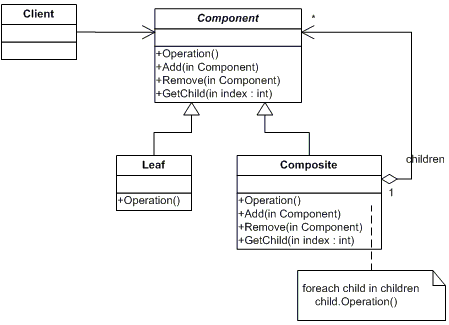c# 组合模式
abstract class Component
{
protected string name;
public Component(string name)
{
this.name = name;
}
public abstract void Add(Component c);
public abstract void Remove(Component c);
public abstract void Display(int depth);
}
class Leaf : Component
{
public Leaf(string name)
: base(name)
{ }
public override void Add(Component c)
{
//throw new NotImplementedException();
Console.WriteLine("Cannot add to a Leaf");
}
public override void Remove(Component c)
{
//throw new NotImplementedException();
Console.WriteLine("Cannot remove to a Leaf");
}
public override void Display(int depth)
{
//throw new NotImplementedException();
Console.WriteLine(new string('-', depth) + name);
}
}
class Composite : Component
{
private List<Component> children = new List<Component>();
public Composite(string name)
: base(name)
{ }
public override void Add(Component c)
{
//throw new NotImplementedException();
children.Add(c);
}
public override void Remove(Component c)
{
//throw new NotImplementedException();
children.Remove(c);
}
public override void Display(int depth)
{
//throw new NotImplementedException();
Console.WriteLine(new string('-', depth) + name);
foreach (Component component in children)
{
component.Display(depth + 2);
}
}
}
class Program
{
static void Main(string[] args)
{
Composite root = new Composite("root");
root.Add(new Leaf("Leaf A"));
root.Add(new Leaf("Leaf B"));
Composite comp = new Composite("Composite X");
comp.Add(new Leaf("Leaf XA"));
comp.Add(new Leaf("Leaf XB"));
root.Add(comp);
Composite comp2 = new Composite("Composite X");
comp2.Add(new Leaf("Leaf XYA"));
comp2.Add(new Leaf("Leaf XYB"));
comp.Add(comp2);
root.Display(1);
Console.ReadKey();
}
}


